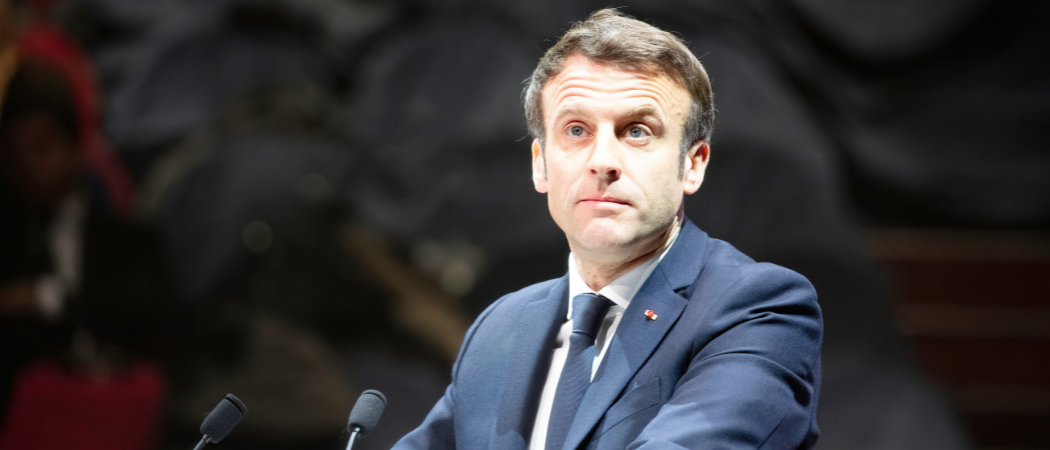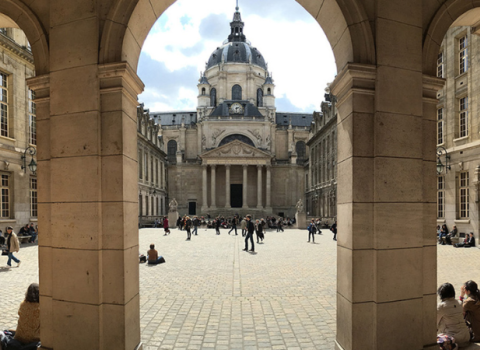A council of 12 research leaders will be set up to advise the French president as part of plans to put science ‘at the heart of decision-making’, while the roles of research institutes and universities will be redefined

French President Emmanuel Macron. Photo: Robert Redeker / Flickr
The French research world is to undergo a “revolution” in the next 18 months in a bid to make it more competitive on the global stage.
The creation of a presidential science council will put science “at the heart of decision-making”, while research institutes will be given greater responsibility for coordinating research at a national level and universities will have more autonomy, president Emmanuel Macron announced in an hour-long speech to more than 300 researchers, heads of universities, research institutions and business leaders at the Elysée Palace earlier this month.
The science council, composed of 12 leading scientists, is to meet the president at least once a quarter to advise him on science policy, a measure that was inspired by a report overseen by the geophysicist Philippe Gillet.
Macron also followed the report’s recommendation to give national research organisations a greater role in steering research programmes at a national level. They will be assigned specific areas for which they will oversee all research and coordinate everyone involved.
CNRS for example is to be responsible for climate, biodiversity and sustainable societies; INRIA for digital; and INSERM for health research.
As programme agencies, the institutes will define research priorities and develop research infrastructure, while gaining the capacity to “be more daring and give full academic freedom to the best and brightest,” Macron said.
There are also big changes ahead for French universities. They “must evolve to take on a central role as leaders in organising and managing scientific research in their regions,” including strengthening links with local industry, said Macron.
He promised that more “autonomous” universities would simplify the administrative burden for researchers.
Currently, teams are often made up of researchers from CNRS, other research bodies and universities, all of whom have a different status, an issue Gillet highlighted in his report, which was commissioned by Higher Education and Research minister Sylvie Retailleau.
“This leads to significant administrative complexity,” Gillet told Science|Business.
A recent report by an international expert group said young researchers in these ‘joint research units’ can spend up to 50% of their time on administrative tasks.
Political priority
Gillet said it is rare for a French president to speak at such length and in such detail about research. This focus reflects fears that France is lagging behind its peers because of fundamental weaknesses in its research system.
Macron spoke of a “strange kind of defeat” in France’s struggle to develop a COVID-19 vaccine, given French researchers were integral to the discovery of messenger RNA on which the most successful products are based.
In Gillet’s view, this was the result of falling behind in synthetic biology at the start of the century, when other countries were investing in blue skies research.
While the complexity of the French system can be an obstacle, Gillet believes it is also an opportunity. Research bodies “are specialised in the important topics of the day,” and can play a key role in responding to societal challenges.
This strategy must leave room for basic research, including more flexible funding that is not always awarded for specific projects, Gillet argues. His report proposed providing all young researchers with a research budget for the first three years of their careers. “Today, all of us feel as though we are recruiting bakers without giving them any flour,” he said.
While Macron did not explicitly reference this suggestion, he did pledge to make research careers more attractive to young professionals.
A ‘sign of trust’ in research bodies
France’s national research organisations welcomed their new role. It is “a sign of trust, but also a great responsibility for our institutes,” said Philippe Mauguin, CEO of INRAE, which will oversee research in sustainable agriculture and food, forests and associated natural resources.
The coordinator role is complementary to the institutes’ own research activities, and will not replace them, said Antoine Petit, CEO of CNRS.
“We will of course continue to do biology, chemistry, IT, engineering, mathematics, physics, humanities and social sciences,” he wrote in a message to CNRS staff. “Most of these subjects are at the centre of none of the agencies; the latter are not designed to cover all disciplines.”
Lightening the administrative burden placed on researchers is also essential, Petit said. “This simplification must be undertaken at every level, including that of the state. The CNRS also has room for improvement, that is undeniable.”
Didier Samuel, CEO of INSERM, praised Macron’s “ambitious vision for the role of science and research.” INSERM is ready to show “we are capable of working with our partners” in coordinating health research. The formation of a presidential science council to bring science closer to decision-making is a good idea, Samuel said.
The rectors’ association France Universités meanwhile welcomed the plans to tackle the complexities of the current system and to “clarify the roles of the different actors”.
The announcements went down less well with France’s main higher education unions. SNESUP-FSU expressed concern that the “centralisation” of research priorities through the programme agencies will limit the freedom of universities and mean less funding for blue skies basic research.
SNESUP-FSU argues that what is really holding back research and innovation is a lack of investment. In 2022, public and private R&D spending in France stood at 2.2% of GDP, slightly lower than the European average and below the EU target of 3%.
However, at a time when member states are looking to cut EU research funding, Macron has made several recent announcements in support of science. In the summer, he committed €500 million to develop AI clusters, and more recently, to spend €1 billion on polar research between now and 2030.
Industrial strategy
Days after unveiling his plans to reform research, Macron visited the Airbus factory in Toulouse, where he pledged to ramp up support for hydrogen, nuclear fusion and carbon capture technologies.
Marking the second anniversary of the €54 billion France 2030 innovation investment plan, he said accelerating production in key technologies is vital. That will mean undertaking a “drastic simplification” of administrative procedures for companies from the start of next year.
“We cannot have procedures which are twice as long as our American or Asian competitors,” Macron said.
Small nuclear reactors is one of the breakthrough technologies that will be prioritised. Macron also wants to “double efforts” on nuclear fusion, superconducting magnets and energy storage.
Decarbonising industry is another focus. Macron said France “must go much faster and stronger” on hydrogen and carbon capture technologies, promising “massive funding to explore the potential of natural hydrogen,” of which France has large reserves.
France will also support the development of a cargo space vessel, and will focus on developing its production capacity in small semiconductors used in AI systems, Macron said.
He reaffirmed his opposition to the EU’s decision to regulate foundational AI models, after the EU Council and Parliament reached an agreement on the AI Act. “I am requesting that we regularly evaluate this regulation, and if we lose leaders or pioneers because of it, we’ll have to reverse course,” he said.





 A unique international forum for public research organisations and companies to connect their external engagement with strategic interests around their R&D system.
A unique international forum for public research organisations and companies to connect their external engagement with strategic interests around their R&D system.